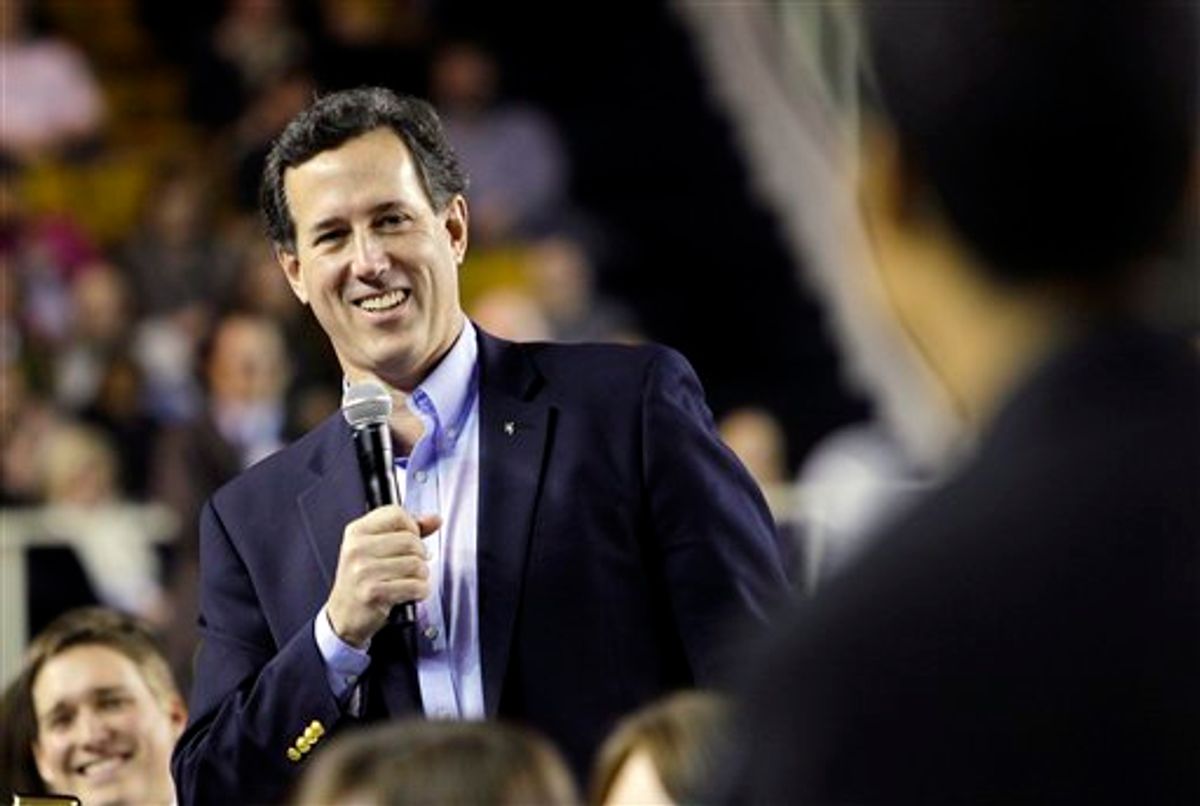It seems clear by now that there's something about Mitt Romney that tends to turn off blue-collar and middle-class Republicans and to turn on rich ones.
In the first three nominating contests, there was a direct relationship between support for the former Massachusetts governor and income level. In South Carolina, for instance, Romney cleaned up among Republicans who make over $200,000 a year, crushing Newt Gingrich by 15 points. But Gingrich won by 20 points among those making between $30,000 and $50,000 and 16 points with those earning between $50,000 and $100,000 -- margins that accounted for his 13-poiunt statewide victory.
The income gap was less apparent in Florida, where Romney posted a comfortable victory, but a recent Wall Street Journal review found that so far Romney has won 46 percent of counties where the median income is higher than the statewide figure -- and just 15 percent of counties where it's lower.
Now, as the action shifts to the Rust Belt and to the South, this class divide looms as a potentially serious problem for Romney. Every recent poll shows him falling behind Rick Santorum in Michigan, where Republicans will vote on Feb. 28, and a survey released Wednesday also has him losing by 7 points in Ohio, whose primary will take place a week later. Crosstabs from the Ohio poll tell the story:
Likely GOP primary voters with incomes under $30,000
Santorum 35%
Gingrich 28%
Romney 27%
$30,000-$50,000
Santorum 51%
Romney 21%
Gingrich 20%
$50,000-$100,000
Santorum 36%
Romney 27%
Gingrich 15%
$100,000+
Romney 40%
Santorum 28%
Gingrich 22%
There seem to be two things going on here. One has to do with the lack of blue-collar enthusiasm for Romney, and the other has to do with those same voters' interest in Santorum. What's interesting is that there's no apparent policy-based explanation for either phenomenon. If anything, you might think that Romney's campaign platform would make him slightly more appealing to lower- and middle-income voters than Santorum, whose tax proposals are skewed to favor the wealthy and corporations even more than Romney's.
But the income divide in the GOP race isn't about policy. It's about identity. No matter how much he earnestly pitches himself as a middle-class crusader, everything about Romney -- his income, his tax status, his lifetstyle, his upbringing, his education, his manner -- reeks of privilege and refinement. This, and not his agenda, is what seems to be rubbing blue-collar Republicans the wrong way. Conversely, Santorum may technically be part of the 1 percent (as the tax returns he released Wednesday night confirmed), but his roots and his style are fundamentally middle-class.
So there's a paradox at work. Republican voters are generally hostile to class-based policy agendas; any attempt to draw attention to income inequality is typically dismissed as "class warfare." But class identity is a major factor in how they're voting this primary season. Because of this, tapping into resentment of Romney has required some rhetorical gymnastics from Santorum, who has gone out of his way to say he has no objections to how Romney made his fortune in private equity. Instead, he's raised Romney's wealth as a strategic matter:
“Having someone that wealthy–was it an issue? Was it an issue in John Kerry’s campaign? It was,” Santorum said, referring to Kerry’s 2004 presidential bid. “That may be an issue with Governor Romney and his appeal to people. And I think that’s something that should be considered by people as to what kind of appeal do they have, what kind of relationship do they have with the kind of voters we need to be able to be successful.”
Maybe this logic resonates with some Republicans. But it's more likely that Santorum is tapping into deeper emotions. As Harold Meyerson explained this week:
Neither Santorum nor Romney will champion policies that could really help the white working class — the unionization of service-sector workers, say, or federal subsidies for strategic industries — but Santorum clearly feels its pain and summons the ghosts of religious and patriarchal orders that once regulated much of working-class life. Romney comes off as the guy who closed the plant, after which those orders collapsed in a heap.
Blue-collar Republicans are apparently fine with a top 1 percent message. But they don't seem to want a top 1 percent messenger. Finding artful ways to stoke that sentiment will be crucial for Santorum if he's going to weather the Romney advertising onslaught that's now underway.
* * *
I talked about the Romney-Santorum fight and the GOP's strange brand of class warfare on "Countdown With Keith Olbermann" last night. The segment is here:



Shares